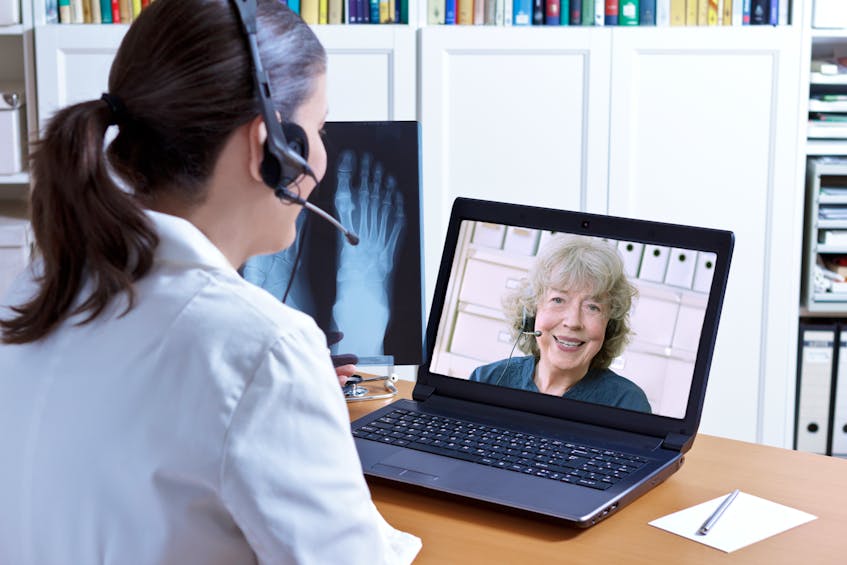Years of being chronically ill have taught Jane Walker how to get as much as possible out of the short time she spends with a doctor.
That’s one reason she loves virtual appointments with her doctors, which began during the height of COVID-19 – they’re efficient, and she can do it safely from her own home, avoiding doctors’ waiting rooms.
With her specialists located in Halifax, the Yarmouth, N.S. resident says she really appreciates having the opportunity to check in via phone rather than having to take an entire day to travel to the city for something as simple as a prescription refill or a 15-minute checkup, especially when she is feeling unwell.
And with a chronic illness, she says how you feel can change on a dime. Being able to have a virtual appointment means that you don’t risk canceling an appointment because you aren’t feeling well enough to leave the house. It just leads to more consistent and accessible care overall, says Walker.
Erica Emma, Springhill, N.S., agrees. Her doctor is also in Halifax, so it’s far easier for her to have an appointment over the telephone instead of having to drive for several hours.
“I don't have to book a whole day off of work and it saves money on gas,” says Emma.

Crucial care
jio
The idea of a virtual physician’s appointment is not a new concept. Telemedicine and video conferencing were happening in more specialized settings prior to the COVID pandemic, explains Dr. Kristy Newson, a family physician in Charlottetown, P.E.I. and co-chairperson of the virtual care taskforce.
Tele-rounding, a similar model where patients who do not have a doctor are seen by physicians virtually, has been happening since 2018 in the Island’s Western Hospital.
“As a physician working throughout the pandemic, it was crucial to have virtual care available to be able to continue to provide care to our patients,” says Newson.
To make that happen, Dr. Robyn MacQuarre, president of Doctors Nova Scotia, says an agreement was struck with government during the pandemic that allowed physicians to bill an office visit for virtual care visits, done either via phone or video.
Before that, she says, virtual care was wrapped up in so much red tape it was challenging for physicians to embrace it and leverage it appropriately, especially as video was restricted to the use of in-hospital technologies.
For virtual care to be effective, it must be for medical issues that can safely and competently dealt with virtually and the patient must consent to the type of appointment being offered, says Newson. Virtual care is not a replacement for in-person care. There are many medical issues that require an in-person visit to your physician’s office, she says.
Workable solution
Overall, patients are very satisfied with the experience.
MacQuarre says the Canadian Medical Association (CMA) recently published survey results showing that Canadians are embracing virtual care options and would like to not only see them continued after the COVID-19 crisis subsides but improved and expanded in the future.
On top of that, MacQuarre says Nova Scotia Health surveyed family physicians and respondents unequivocally stated that virtual care fees allowed them to continue to care for patients (both via virtual means and in-person) throughout the pandemic.
By allowing for billing of virtual care appointments, physicians were able to work through the pandemic in ways that protect them and their most vulnerable patients, limiting face-to-face contact when it could reasonably be avoided, says MacQuarre.
Physicians can decide for themselves how to schedule these appointments. MacQuarre says in some cases, exact appointment times are given; in other cases, it’s a broader timeframe. Some virtual care solutions use a “waiting room” where a few patients log in and then are held in a virtual waiting room, until the doctor invites the patient into the call.
Newson’s patients are scheduled throughout the day and she calls them between in-person patient visits and at the beginning and end of the day. Video conferencing appointments are booked for a scheduled time, similar to any other meeting.
“It is important to ask the patient if it is a good time and place to take the call, for confidentiality concerns and patient comfort,” says Newson.
Some patients concerned
Despite the overwhelming success of virtual appointments, the system still does not work for everyone.
Kristen Mills, from Halifax, N.S. says she finds virtual appointments offer a lower quality of care as you can’t build a good relationship with a doctor over the phone.
“I have trouble hearing low tones and male voices on calls that are cell phone to cell phone. Some calls also cut out, leaving me frustrated at the end of the call. Its hard to hear everything that is said,” says Mills.
Walker and Emma agree that these virtual appoints may impose challenges for seniors or those with special needs or who may not speak English as their primary language.
“Not all appointments are appropriate for a virtual care option, sometimes you just need to see someone in person,” says Walker.
Newson says there are always options.
The patient always has the option of booking an in-person appointment if they are not comfortable with virtual care. Also, the patient can opt to have a family member with them on the virtual call to help take down information or for hearing concerns, says Newson.
In the long run, Newson says virtual physician appointments are here to stay.
“The COVID-19 pandemic moved virtual care to the forefront of people’s minds but modifying the way health care is delivered on P.E.I. is continually evolving,” she says.
“As physicians and patients become more comfortable and experienced with the type of care that can be offered virtually, it is will be an option for Islanders going forward."
MacQuarre says Doctors Nova Scotia supports the continuation of virtual care throughout and beyond the pandemic, and with both providers and patients welcoming virtual care, she hopes it’s here to stay. For now, however, the agreement with the Nova Scotia government to bill for virtual care currently ends on Sept. 30, with no word on an extension as of mid-September.
“Doctors Nova Scotia will continue to advocate for physicians and patients to make virtual care part of the way care is delivered,” says MacQuarre.
This pandemic has taught us in medicine, to think outside the box, says Newson. We must expand how we provide care to continue to serve our patients safely.









